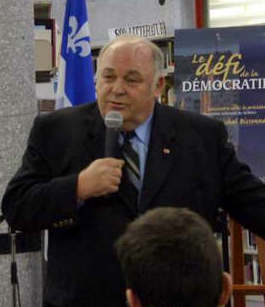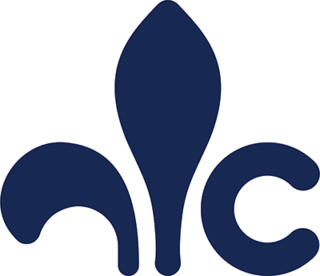Florian Guay was a politician in Quebec, Canada and a Member of the National Assembly of Quebec (MNA). [1]
Florian Guay was a politician in Quebec, Canada and a Member of the National Assembly of Quebec (MNA). [1]
He was born in Saint-Léon-de-Standon, Quebec on November 23, 1941. Prior to running for office, he was a Social Credit activist and managed a furniture store.
Guay ran as a candidate of the Ralliement créditiste in the 1970 provincial election and won, becoming the Member of the National Assembly for the district of Dorchester.
During his term of office, the party was plagued by internal divisions. While three MNAs remained loyal to Leader Camil Samson, Guay and the rest of the caucus withdrew their support and appointed Armand Bois as temporary leader, until a leadership convention could determine a new leader.
Eventually, the Samson faction re-joined the party and Yvon Dupuis was chosen as leader. Nonetheless, Guay was defeated and finished third in the district of Beauce-Nord in 1973.
Guay was City Councillor from 1974 to 1975 and Mayor from 1975 to 1979 in Saint-Léon-de-Standon.
After leaving office, he worked as a building contractor.

The Action démocratique du Québec, commonly referred to as the ADQ, was a right-wing populist and conservative provincial political party in Quebec, Canada. On the sovereignty question, it defined itself as autonomist; it had support from nationalists and federalists. Its members were referred to as adéquistes, a name derived from the French pronunciation of the initials 'ADQ'.
The Ralliement créditiste du Québec was a provincial political party in Quebec, Canada, that operated from 1970 to 1978. It promoted social credit theories of monetary reform, and acted as an outlet for the expression of rural discontent. It was a successor to an earlier social credit party in Quebec, the Union des électeurs which ran candidates in the 1940s.

Michel Bissonnet, MNA is a Canadian politician who served as Liberal member and President of the National Assembly of Quebec.
Camil Samson was a politician in Quebec, Canada, Member of the National Assembly of Quebec (MNA), and leader of the Ralliement créditiste du Québec and other political parties.

Onésime Gagnon was a Canadian politician who served as the 20th Lieutenant Governor of Québec.
Robert Cliche was a Canadian lawyer, politician and judge.
Armand Bois (1920-2001) was a politician in Quebec, and a Member of the National Assembly of Quebec (MNA).
Yvon Brochu was a politician in Quebec, Canada, and a Member of the National Assembly of Quebec (MNA).
Gilles Baril is a Canadian businessman, journalist and former politician in Quebec, Canada. He was a Parti Québécois member of the National Assembly of Quebec (MNA).
Aurèle Audet was a politician in Quebec, Canada and a Member of the National Assembly of Quebec (MNA).
Ronald Tétrault was a politician in Quebec, Canada and a Member of the National Assembly of Quebec (MNA).
Bernard Dumont was a politician in Quebec, Canada. He was a member of the House of Commons of Canada and a member of the National Assembly of Quebec.
Antoine Drolet was a politician in Quebec, Canada and a Member of the National Assembly of Quebec (MNA).
Paul-André Latulippe was a politician in Quebec, Canada and a Member of the National Assembly of Quebec (MNA).
Jean-Louis Béland was a politician in Quebec, Canada and a Member of the National Assembly of Quebec (MNA). He was born in Saint-Gilles, Quebec on November 27, 1932.

The 2012 Quebec general election took place in the Canadian province of Quebec on September 4, 2012. Lieutenant Governor Pierre Duchesne dissolved the National Assembly on August 1, 2012, following Premier Jean Charest's request. The Parti Québécois were elected to a minority government, with Pauline Marois becoming the first woman to be Premier of Quebec. The Quebec Liberal Party took second place, with Premier Jean Charest losing his seat. The newly formed party Coalition Avenir Québec led by François Legault took third place, while Québec solidaire took 2 seats out of the 125.

The Conservative Party of Quebec is a provincial political party in Quebec, Canada. It was authorized on 25 March 2009 by the Chief Electoral Officer of Quebec. The CPQ has gradually run more candidates in successive elections, with 27 in the 2012 general election and 125 in 2022. The party has not won a seat in the National Assembly of Quebec; however, under leader Éric Duhaime the CPQ won about 12.9% of the popular vote in the 2022 election, a major increase from prior elections. Previously on June 18, 2021 Claire Samson crossed the floor to join the party after having won election in 2018 as a candidate of the governing Coalition Avenir Québec (CAQ).
Linda Goupil is a former Canadian politician, who represented the electoral district of Lévis in the National Assembly of Quebec from 1998 to 2003. First elected in the 1998 provincial election, she sat as a member of the Parti Québécois caucus, and served in the Executive Council of Quebec as Minister of Justice from 1998 to 2001.

The 44th Quebec general election is scheduled to take place on or before October 5, 2026, to elect the members of the National Assembly of Quebec. Under the province's fixed election date law, passed in 2013, "the general election following the end of a Legislature shall be held on the first Monday of October of the fourth calendar year following the year that includes the last day of the previous Legislature", setting the date for October 5, 2026. However, the act does not fetter the discretion of the Lieutenant Governor of Quebec to dissolve the legislature before that time, in accordance with the usual conventions of the Westminster parliamentary system.